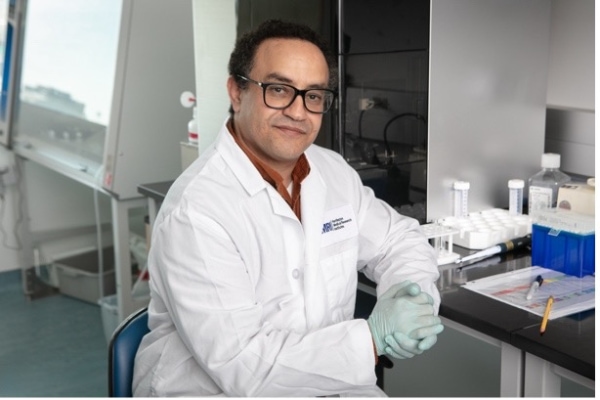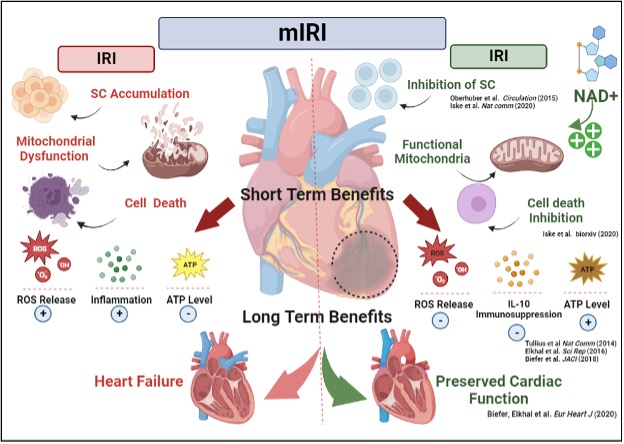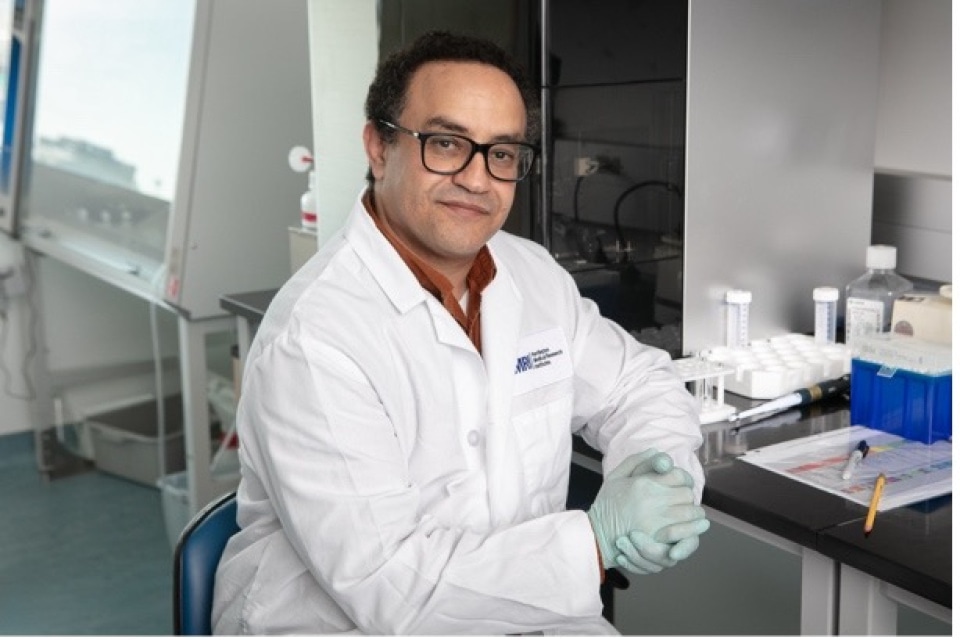
Abdala Elkhal, PhD, assistant professor of Immunology and head of the Neuro- Cardio- Immunology Laboratory at HMRI, leads research focused on the role of nicotinamide adenine dinucleotide (NAD+) in immune system regulation and its therapeutic potential to reduce inflammation and reverse diseases.
Dr. Elkhal received his PhD in Cell Biology and Biochemistry from the University Rene Descartes Paris V, France, and completed his postdoctoral work at Boston Children’s Hospital / Harvard Medical School. From 2006-2020, Dr. Elkhal was a faculty member in the Departments of Medicine and Surgery at Harvard Medical School. In 2022, Dr. Elkhal joined HMRI as a lead investigator to study the role of nicotinamide adenine dinucleotide (NAD+) in immunity and inflammatory diseases, including neurological and cardiovascular diseases, and their vital connection. Dr. Elkhal’s was the first to identify NAD+, a natural co-factor found in all living cells, as a major regulator of the immune system. He has shown that NAD+ regulates CD4+ T cell differentiation independently of major antigen-presenting cells (APCs) and TCR-MHC crosstalk. His work has potential use and benefits in numerous inflammatory diseases, including autoimmune conditions, diabetes, stroke, hemophilia, infectious disease, and transplantation.
Dr. Elkhal’s laboratory has shown that nicotinamide adenine dinucleotide (NAD+) can trigger an immune response in the absence of antigen, APCs, and MHC-TCR interaction. Dr. Elkhal’s team has demonstrated that NAD+ mediates this immune response via mast cells, which are mainly considered to play a role in allergic immune response. Moreover, Dr. Elkhal’s lab has shown that NAD+ could protect against autoimmune diseases and lethal infections. The lab is still investigating how NAD+ regulates other immune cells and its application in other life-threatening diseases. Dr. Elkhal’s work has unraveled a novel pathway that does not require APCs and MHC-TCR interaction and is able to regulate immune cells, including macrophages, dendritic cells, mast cells, CD4+and CD8+ T cells. This promising novel pathway will allow us to further understand how immune cells communicate and will help to develop novel therapeutic methods for diseases or inflammatory processes such as autoimmune diseases, infection, and hemophilia, and in the field of transplantation.
Dr. Elkhal’s current research focuses on studying the impact of NAD+ in cardiovascular diseases. Cardiovascular disease (CVD) is the leading cause of death in the United States and throughout the world. Among CVD, coronary heart disease (CAD) is the most common type of CVD, as well as cerebrovascular disease, including stroke and transient ischemic attack. One project investigates whether NAD+ can protect or ameliorate heart function following myocardial infarction (Fig. 3). A second project focuses on creating an innovative approach to enhance coagulation and develop new treatments for blood disorders like hemophilia and hemorrhage. Finally, Dr. Elkhal’s research centers on brain inflammation and neurological disorders associated with aging.

Fig. 3. Protective mechanism of NAD+ in cardiac inflammation.

Abdala Elkhal, PhD
Assistant Professor, Immunology Neuro- Cardio- Immunology
Abdala Elkhal, PhD, assistant professor of Immunology and head of the Neuro- Cardio- Immunology Laboratory at HMRI, leads research focused on the role of nicotinamide adenine dinucleotide (NAD+) in immune system regulation and its therapeutic potential to reduce inflammation and reverse diseases.
Dr. Elkhal received his PhD in Cell Biology and Biochemistry from the University Rene Descartes Paris V, France, and completed his postdoctoral work at Boston Children’s Hospital / Harvard Medical School. From 2006-2020, Dr. Elkhal was a faculty member in the Departments of Medicine and Surgery at Harvard Medical School. In 2022, Dr. Elkhal joined HMRI as a lead investigator to study the role of nicotinamide adenine dinucleotide (NAD+) in immunity and inflammatory diseases, including neurological and cardiovascular diseases, and their vital connection. Dr. Elkhal’s was the first to identify NAD+, a natural co-factor found in all living cells, as a major regulator of the immune system. He has shown that NAD+ regulates CD4+ T cell differentiation independently of major antigen-presenting cells (APCs) and TCR-MHC crosstalk. His work has potential use and benefits in numerous inflammatory diseases, including autoimmune conditions, diabetes, stroke, hemophilia, infectious disease, and transplantation.
Dr. Elkhal’s laboratory has shown that nicotinamide adenine dinucleotide (NAD+) can trigger an immune response in the absence of antigen, APCs, and MHC-TCR interaction. Dr. Elkhal’s team has demonstrated that NAD+ mediates this immune response via mast cells, which are mainly considered to play a role in allergic immune response. Moreover, Dr. Elkhal’s lab has shown that NAD+ could protect against autoimmune diseases and lethal infections. The lab is still investigating how NAD+ regulates other immune cells and its application in other life-threatening diseases. Dr. Elkhal’s work has unraveled a novel pathway that does not require APCs and MHC-TCR interaction and is able to regulate immune cells, including macrophages, dendritic cells, mast cells, CD4+and CD8+ T cells. This promising novel pathway will allow us to further understand how immune cells communicate and will help to develop novel therapeutic methods for diseases or inflammatory processes such as autoimmune diseases, infection, and hemophilia, and in the field of transplantation.
Dr. Elkhal’s current research focuses on studying the impact of NAD+ in cardiovascular diseases. Cardiovascular disease (CVD) is the leading cause of death in the United States and throughout the world. Among CVD, coronary heart disease (CAD) is the most common type of CVD, as well as cerebrovascular disease, including stroke and transient ischemic attack. One project investigates whether NAD+ can protect or ameliorate heart function following myocardial infarction (Fig. 3). A second project focuses on creating an innovative approach to enhance coagulation and develop new treatments for blood disorders like hemophilia and hemorrhage. Finally, Dr. Elkhal’s research centers on brain inflammation and neurological disorders associated with aging.

Fig. 3. Protective mechanism of NAD+ in cardiac inflammation.
